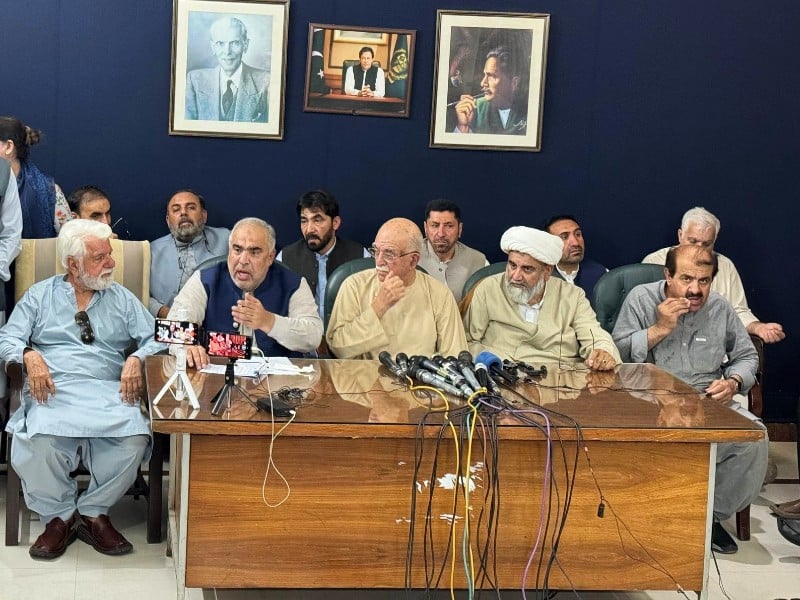PESHAWAR/
LAHORE/
ISLAMABAD/QUETTA/
QUETTA:
All opposition parties, including the PTI and the JUI-F, have unanimously rejected the PML-N-led federal government’s decision to launch another military operation to counter the rising threat of terrorism, warning that such an operation will be counterproductive.
The Central Apex Committee of the National Action Plan (NAP)—a panel comprising the prime minister, provincial chief ministers, and top military leadership—announced on Saturday the launch of Operation Azm-e-Istehkam, Pakistan’s eleventh military campaign against militancy since the start of the US-led War on Terror in 2001.
According to a statement issued after the meeting by the PM House, the new operation aims to “integrate and synergize multiple lines of effort to combat the menace of extremism and terrorism in a comprehensive and decisive manner.”
A day after the announcement, the PTI opposed the new operation during a National Assembly session. Party lawmakers contended that the NAP apex committee was not empowered to make decisions about launching a military campaign and that the matter must be brought to parliament. The government later offered to give the parliamentarians an in-camera briefing on the operation.
However, on Monday, different opposition party leaders separately rejected the move.
The JUI-F chief, Maulana Fazlur Rehman, whose party was a key member of the last PML-N-led ruling coalition, said in a press conference in Quetta that Operation Azm-e-Istehkam would prove to be “Operation Adam Istehkam,” a campaign leading to instability and chaos.
According to Fazl, he and other citizens of the country hold the Computerized National Identity Card just like the army chief, General Syed Asim Munir, adding that all citizens are equal in the eyes of the law.
“However, a group wants to act like the master while imposing the role of slaves on others. I want to make it clear that we are not going to accept this subjugation. We have a 300-year history of fighting the oppression of the British, a war in which 50,000 mujahedeen were martyred.”
He asked if Pakistan was created to be ruled by generals and if the rest of the people were destined to be driven like cattle. “This is not going to happen,” he added.
The JUI-F chief also questioned the legitimacy of the apex committee.
“At the tehsil level, a major sits on the apex committee; at the district level, a colonel sits on the panel; at the provincial level, the corps commander; and at the federal level, the army chief sits on the apex committee. When a uniformed person is present in a meeting, can the civilians disagree?”
He said in the end, the military will shift the responsibility of the operation onto the politicians. “Prime Minister Shehbaz Sharif may happily accept this responsibility, but Shehbaz Sharif is not a prime minister; he is just sitting on the PM’s chair, and he is content with that,” he added.
Speaking in the National Assembly, PkMAP chief Mahmood Khan Achakzai also vehemently opposed the military operation, accusing the establishment of creating the Frankenstein of militancy.
Achakzai, who also heads an opposition parties’ alliance including the PTI, lamented that despite the passage of 75 years, the people of Pakistan have not been able to become a single nation.
He urged the government to desist from launching a fresh operation, warning that otherwise it would spark bloodshed that would spell doom for the country.
The Jamaat-e-Islami chief, Hafiz Naeemur Rehman, also rejected the military operation, stating that Pakistan needs political stability, not another military operation. He said the decision to launch Operation Azm-e-Istehkam was made while completely disregarding the parliament.
“There was no consultation with the national, political, and democratic leadership on the operation. Without national consensus, the operation will not be able to achieve its objectives,” he said.
K-P Chief Minister Ali Amin Gandapur, who belongs to the PTI and who was present in the Central Apex Committee meeting, said during the Saturday meeting that the participants were given a briefing on policy, but there was no mention of any military operation.
After a meeting chaired by the K-P CM, PTI leader Barrister said consultation with provinces is necessary before starting a new military operation. “The federal government should take parliament and provincial assemblies into confidence for action against terrorism. All political parties in Pakistan should be consulted on the matter.”
He said this is an extremely important issue linked to national security. “Until the outlines of the operation are clear, we cannot decide on supporting the operation,” he added.
After a meeting with K-P Governor Faisal Karim Kundi, ANP leader Mian Iftikhar also rejected the military operation, stating that his party had serious reservations about it and that any new military campaign was not acceptable.
“The decision for Operation Azm-e-Istehkam was unilateral. People should be taken into confidence through the national and provincial assemblies regarding negotiations and operations. The ANP is calling an All Parties Conference (APC) on the issue,” he said.

